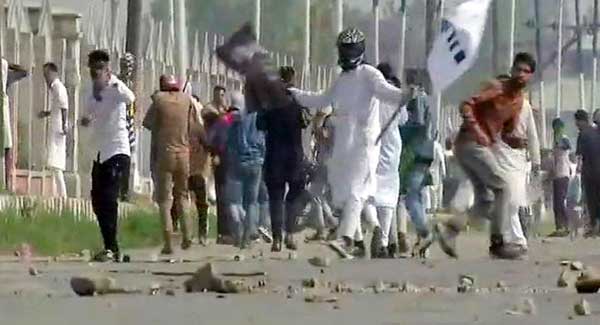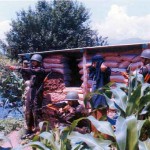J&K Governor Satya Pal Malik’s statement “we have to kill militancy, not militants. We have to make militancy useless in the eyes of the people” drew applause from all around. Coming from an Indian politician – former Member Parliament, who has also been Governor in Odisha and Bihar, is rare. But isn’t this the gospel truth for any and every militancy around the world? Isn’t this what Army Chiefs have been conveying by saying that the Army can only keep violence to manageable levels but the state has to play the rest – kill militancy through good governance and managing social change? In fact when General VK Singh as Army Chief, now MoS (EAM), had said so, Farooq Abdullah went berserk alleging the Army Chief was overstepping his sphere.
Killing militancy implies elimination of public support for the militants, causing militants to surrender or the hardcore who defy giving up violence get killed. In an interview in New York on September 15, 2003, the Dalai Lama had stated, ‘‘Terrorism is the worst kind of violence, so we have to check it, we have to take countermeasures…. We have to deal with their motivation… ‘Terrorism comes out of hatred, and also short-sightedness.” Not that this was not known to the previous J&K governments and the MHA, but with their cross-border and underhand terrorist links, neither the NC nor the PDP were interested in resolving militancy. When Panchayat elections were to be held, Mehbooba Mufti released hundreds of stone-pelters from jails to vitiate the environment. J&K gets 10% of Central funds with only 1% of India’s population, funds for terrorism from within and from outside the country plus funds diverted within the State – all of which is paradise for Valley politicians at public expense.
Governor Malik struck two vital chords early. First was the decision to hold the Urban Local Body (ULB) and Panchayat polls. But even more significant was the second action in announcing that if these polls are not held: J&K may lose Rs 4,335 cr (Rs 3,029 for Panchayats and Rs 1, 306 for ULBs) as these funds do not come to the State Government but directly to these bodies; government is taking action to empower Panchayats more, for example, funds for schemes like MNREGA, NRLM, PMAY, ICDS and mid-day meal will be routed through Panchayats; each Panchayat will have Rs 50 lakh to Rs 1 crore annually for local development, Panchayats can levy local taxes and will be given control of grazing lands, and; after Panchayat polls, indirect polls will be held for Block Development of Panchayats.
Above are landmark reforms to empower public at the grass-root level, perhaps never attempted before or not executed in earnest. Consider the two-day round-table Delhi Policy Group organized in March 2012 for MPs, MLAs, MLCs of J&K, attended by some other MPs and policy analysts, where unanimous grouse was that Panchayats had no money, no powers. When asked why not, the answer was that the J&K State Government does not permit it. Obviously the State Government was somehow squandering off even those funds that were meant to go directly to Panchayats. Jammu and Ladakh lamented being denied fair share of finances – which has been happening past decades.
The PDP, NC and CPI (M) have boycotted the civic polls on the issue of Article 35-A although Malik has had dialogue with all political parties since July this year; explaining that the next elected government should be the one defending Article 35-A in the Supreme Court. The public has responded to the municipal polls with only Congress and BJP candidates in the fray. Voting was very low in the Valley because of boycott by NC, PDP, CPI (M) and threat of violence, Conversely, voting was high in Ladakh and very high in Jammu. But the municipal polls have gone through and that too peacefully. Because of low turnout in the Valley many candidates won uncontested. Panchayat polls are slated in nine phases on November 17, 20, 24, 27, 29, December 01, 04, 08 and 11, with counting on the day of polling. Hopefully these will go through without violence despite being in thick of winter.
The challenge thereafter will be to take the process of normalization forward, aside from safety of those elected, as implementation of grass-root empowerment is likely to be resisted by terrorists, their political peers and cross-border mentor-benefactors. Examination of following issues that emerged from the abovementioned Delhi Policy Group round-table in 2012 could also assist in ushering in normalization:
- Little development and lack of power.
- Corruption in J&K is ‘double’ than rest of India.
- Locals perceive CM, MLAs and MLCs as agents of Delhi.
- There would be chaos if security forces are removed from the area.
- Prevailing peace is misnomer with increased militancy in Pakistan.
- Speakers from Jammu and Ladakh wanted ‘reorganization’ of J&K – including renaming it J&K&L (Jammu, Kashmir & Ladakh).
- Durbar move from Srinagar-Jammu and back costs Rs 300 cr and Chief justice move without High Court retinue can’t trace files, causing loss. This 1872 legacy must be scrapped by cash-strapped J&K.
- Militancy has become industry of some politicians.
- Ladakh has poor roads, little power and poor tourism infrastructure despite considerable potential.
- Displaced persons (both side of the border including on account of 1965 and 1971 wars) cannot vote.
- Reserve constituency census is slated only in 2026 – it should be ealier.
- Gujjars have been accorded reservation under SC/ST but Paharis are denied same despite promises made years back.
- Village Defence Committees who fight militants get measly monthly stipend of Rs 3000 which has to be shared amongst 7-8 persons.
- Schools / hospitals burnt by militants need to be rebuilt.
- Compensation for land occupied by security forces remains pending.
- Goi projects bring their own Bihari labour, denying employment to locals.
- Tangdhar bowl is cutoff for months in winter but no tunnel is planned.
- Obtaining passport takes years and even denied on grounds of verification in case a relative is in Pakistan
- Investments in J&K should be encuraged to provide employment.
How many of the above issues have been examined till now is not known but there is proof of PDP links with Hijbul Mujahedeen and Hurriyat with Pakistan including Geelani with the LeT. But aside from the abovementioned issues, Governor Malik is faced with the herculean tasks of dealing with multiple issues. Radicalization and Islamist jihad has taken root in the most violence prone districts, as is evidenced by well educated youth taking to terrorism. This requires a psychological approach in addition to other measures. President Sisi of Egypt had clamped down on the Islamists by bluntly telling them that one billion Muslims cannot kill six billion non-Muslims and vice versa.
During the Herat Security Dialogue IV in Afghanistan on October 2-3, 2015, Chief Guest Salman Khurshid (former India EAM) spoke of inter regional civilization influences and explained that Hinduism is a way of life that embraces all and that India has Muslim Hindus, Christian Hindus, Buddhist Hindus, Jain Hindus etc; which is common phenomenon. Dr Ali Akbar Shah from Delhi University said that the Islamic countries should learn from India where mysticism of all religions including of Islam have been amalgamated and absorbed. As for Islam, India has absorbed both the Islam brought by invaders as well as by sages like Khwaja Moinuddin Chishti. He said there is need to revive the true spirit of Islam and while everyone knows what has gone wrong, we need to act to set it right. This is one type of discourse J&K population needs. However, the hardcore terrorists under Pakistani influence may be beyond redemption; Aziz Royesh, President of Marefat High School stated in Heart during the above dialogue that Pakistan has 83,000 madrassas that are not integrated in the eduction system and that even if 10,000 of these are producing suicide bombers then 50 suicide attacks can be expected every day of the year.
Governor Malik will need to closely examine what is being taught to the children in governmental and non-government educational institutions. A major task will be to deal with Wahabi clerics who over the years have replaced the ones that followed Sufi culture. Multiple countermeasures will be required to tame the politicians who are supporting and orchestrating the terrorism-industry. Budding political leaders need to be encouraged to compete with PDP, NC and hardcore Hurriyat separatists. Centre and State projects would need to be synergized for benefiting public optimally – which has been a lacuna in many instances. Countering Pakistan’s proxy war must be joint Centre-State effort. But finally, will Governor’s rule continue for sufficient period to usher in normalcy to requisite levels? What happens when the next J&K State elections take place – in the event of PDP or NC getting back to power, will militancy-industry bloom again?






Another excellent piece by one of the most well-read and articulate defence analysts in the country today.